May 21, 2025 | 04:33 GMT +7
May 21, 2025 | 04:33 GMT +7
Hotline: 0913.378.918
May 21, 2025 | 04:33 GMT +7
Hotline: 0913.378.918
Visiting Mr. Pham Thanh Chung's dried pepper production facility in the border district of Loc Ninh - one of Binh Phuoc’s “pepper capitals”, we could not help but be surprised.
The factory system looked so modern, with advanced machinery and equipment fully equipped. The staffs were professional from production to product marketing. Next to the facility was a lush green pepper garden laden with fruits entering the harvest period.
None would have thought that the owner of this establishment was a farmer from head to toe. The only difference was that he loved to tinker with research and business, and then became one of the people who boldly put Binh Phuoc pepper into processing and gradually brought the local pepper brand reach far and wide.
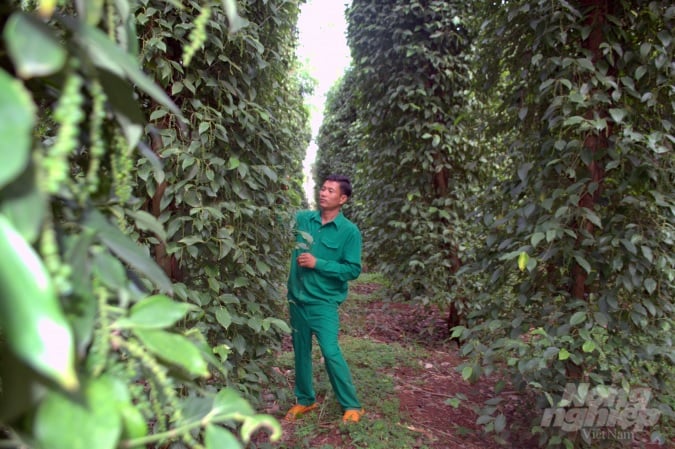
The lush green pepper garden of Mr. Chung. Photo: Tran Trung.
According to Mr. Chung, in 2016 the pepper price cycle began to go down along with complicated weather, climate changes, and the Covid-19 outbreak. The pepper cultivation scene went dire. Many growers were put in debt.
Could not bear to see the 4,000-pillar pepper garden that was once a good source of income for the family slowly close to abandonment, he sought ways to reduce production costs. He started researching the methods to create "homemade” organic fertilizers from available local agricultural by-products.
He mixed clamshells and eggshells with other preparations containing beneficial microorganisms that decompose quickly to create a fertilizer rich in calcium and potassium. With the same recipe, he continued to use shrimp and fish carcasses from the market, and a fertilizer rich in protein was born.
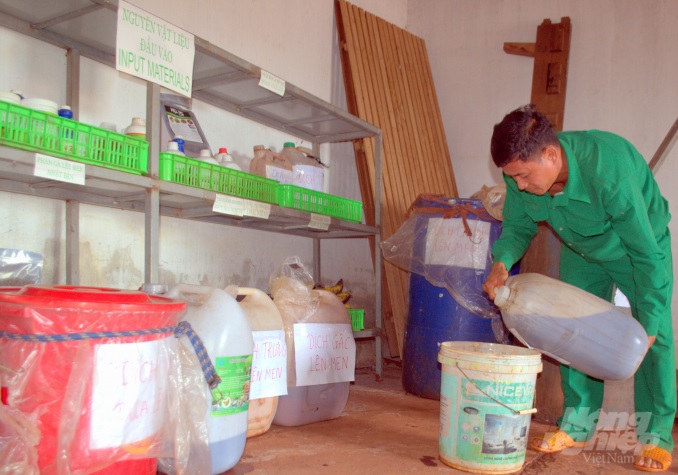
Mr. Chung himself researched and developed biological products and fertilizers from local agricultural by-products. Photo: Tran Trung.
In order to turn the soil into a habitat for beneficial microorganisms, which quickly absorb fertilizers, he also grew Pinto peanut. This is one of the leguminous plants with the ability to retain moisture, prevent erosion, and create porosity for the soil. He used this grass as food for goats, and manure from the goat barn would be composted to become fertilizer for the pepper garden.
But Mr. Chung didn’t stop there. Realizing that local pepper was mainly sold raw and had low value, he continued to research to create processed pepper products. Thanks to the reputation of a facility producing clean pepper, his products not only fully complied with the organic production procedure but also possessed traceability from the seedling, caring process to the final product. As soon as it was introduced to the market, Mr. Chung's processed products were well received by consumers near and far.
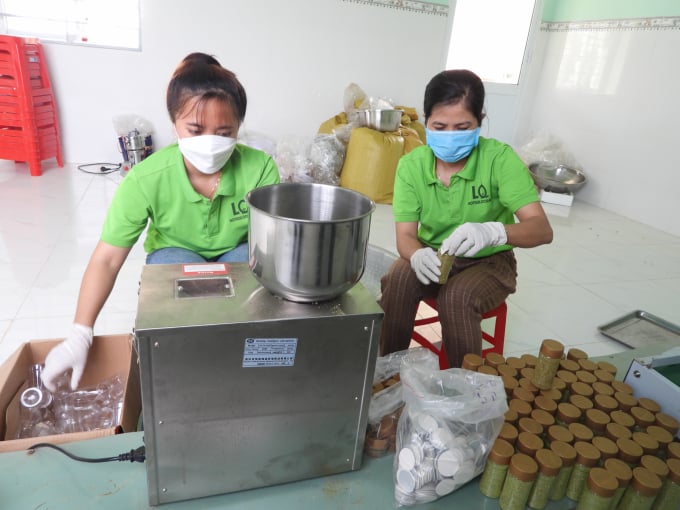
Product packaging segment after processing. Photo: Tran Trung.
“When the product gradually gained a foothold in the market, I started considering the creation of a solid production link and raw material areas with the locals to get rich together”. More than anyone else, with nearly 20 years of working with pepper plants, Mr. Chung understands the plight of people in the same situation. He wants them to become the true master of their land.
With the motto "If you want to go fast, go alone; if you want to go far, go together," he encouraged other pepper growers in the area to establish Loc Quang Organic Pepper Cooperative.
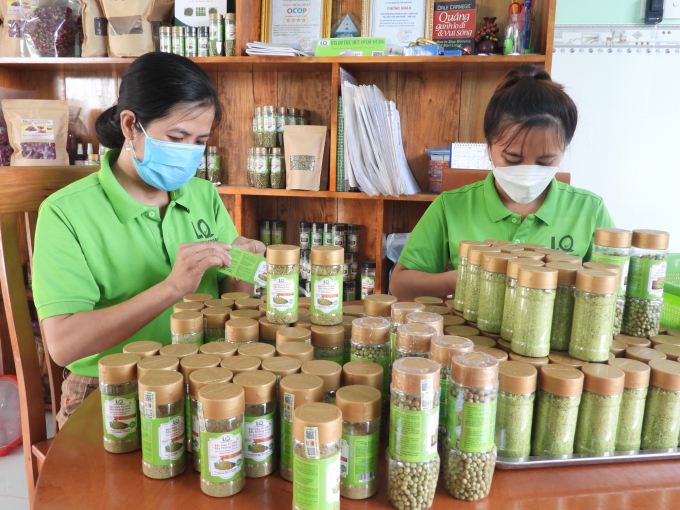
Products are stamped with label marks, traceable stamps and QR codes before going to the market. Photo: Tran Trung.
The cooperative made its first appearance in May 2020, had 9 members and a production area of over 21 ha. As young as it may seem, with the enthusiastic support of Mr. Chung from the secret of organic pepper cultivation to the commitment to underwrite products at high prices, more and more people write applications to join. The cooperative now has 16 members with a total area of nearly 50 ha and is constantly growing.
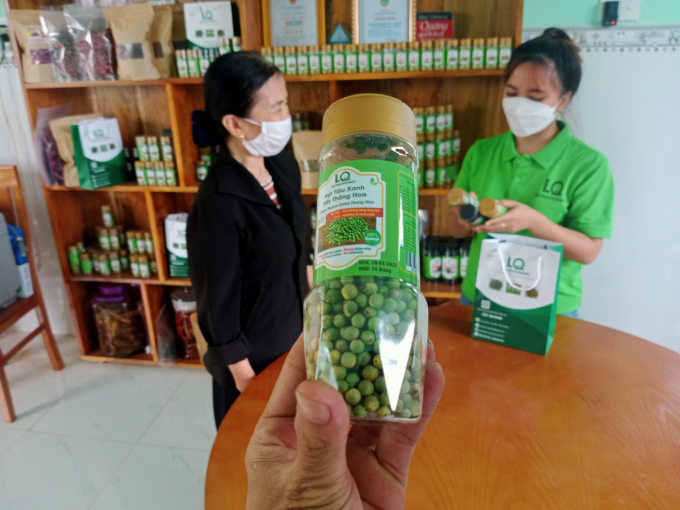
The processed pepper products of Loc Quang Organic Pepper Cooperative gain the trust of many consumers. Photo: Tran Trung.
“In order to bring into full play the available potential, apart from directly selling and supplying to existing supermarket systems, the cooperative also applies internet and digital technology to bring products to popular commercial channels such as Lazada, Shopee, and Tiki. We are promoting more to have our product appear on international trading platforms to reach partners and consumers faster. Our goal is to further promote the brand and call for more investment linkage,” said Mr. Chung.
Translated by Samuel Pham

(VAN) Khanh Hoa is investing over 545 billion VND to develop 240 hectares of high-tech marine aquaculture in order to guarantee a consistent supply of seafood exports and achieve the USD 1 billion target.

(VAN) Minister of Agriculture and Environment Do Duc Duy held a meeting with Soopakij Chearavanont, Chairman of C.P. Group, on May 15.
/2025/05/16/3800-0-nongnghiep-143756.jpg)
(VAN) Suntory PepsiCo Vietnam coordinated with the Ministry of Education and Training to implement an education program on water conservation, reaching nearly 1 million primary school students nationwide.

(VAN) Vietnam’s TH Group officially put its high-tech fresh milk processing plant into operation in the Russian Federation, marking a historic moment as the first TH true MILK cartons were produced in Russia.

(VAN) Use of high-quality broodstock and biotechnology is regarded as the most effective approach to ensuring sustainable and economically viable shrimp aquaculture ahead of climate change and the emergence of increasingly intricate disease patterns.

(VAN) Carbon farming is a form of agricultural practices that helps absorb more greenhouse gases than it emits, through smart management of soil, crops, and livestock.

(VAN) This is a key content of the Memorandum of Understanding recently signed between the Vietnam Fisheries Society and Kunihiro Inc of Japan.